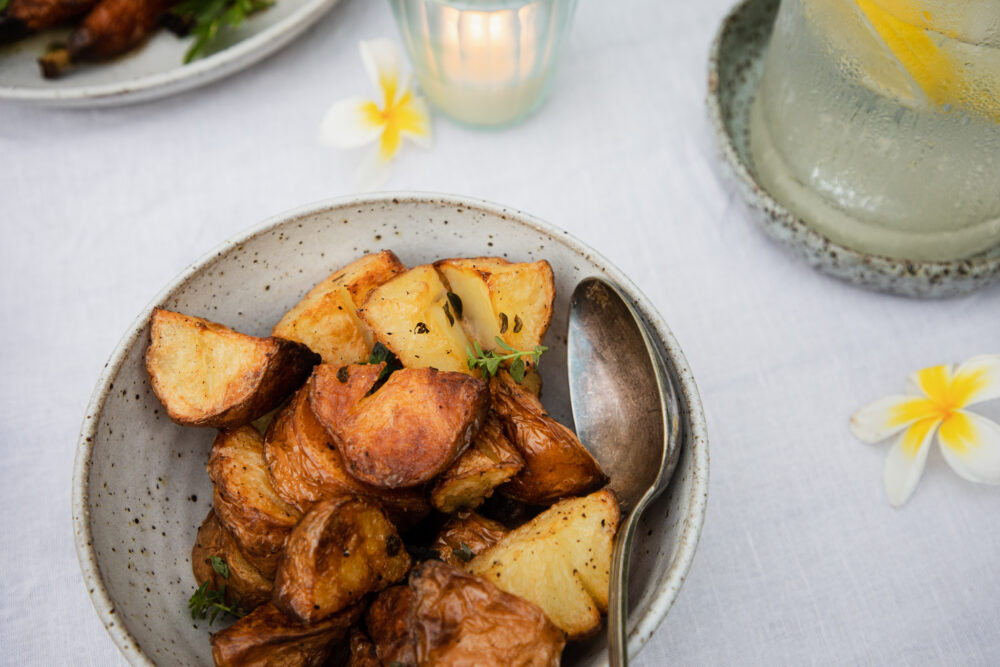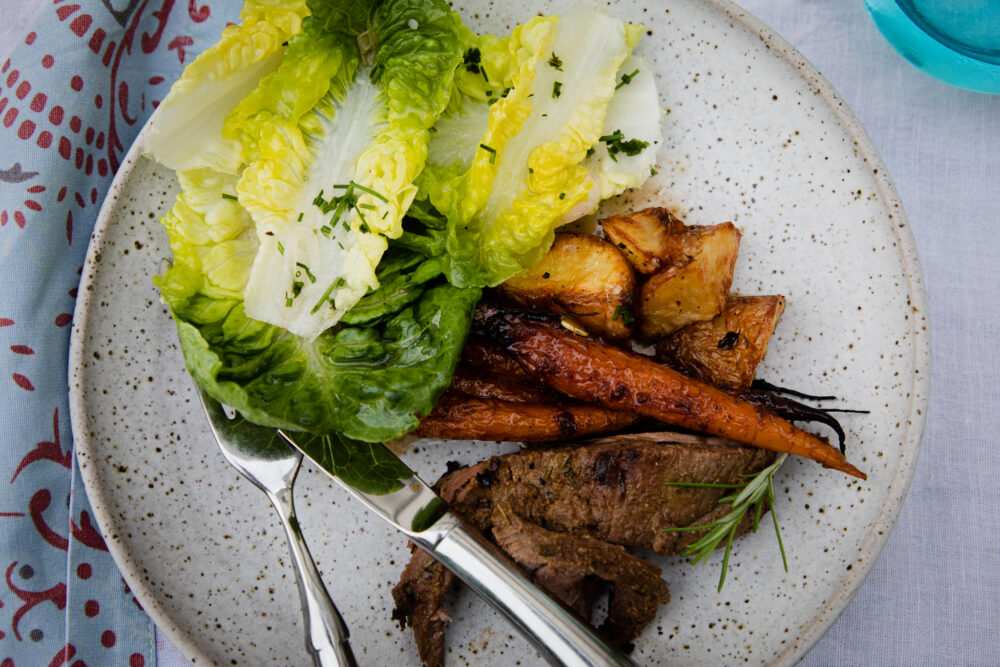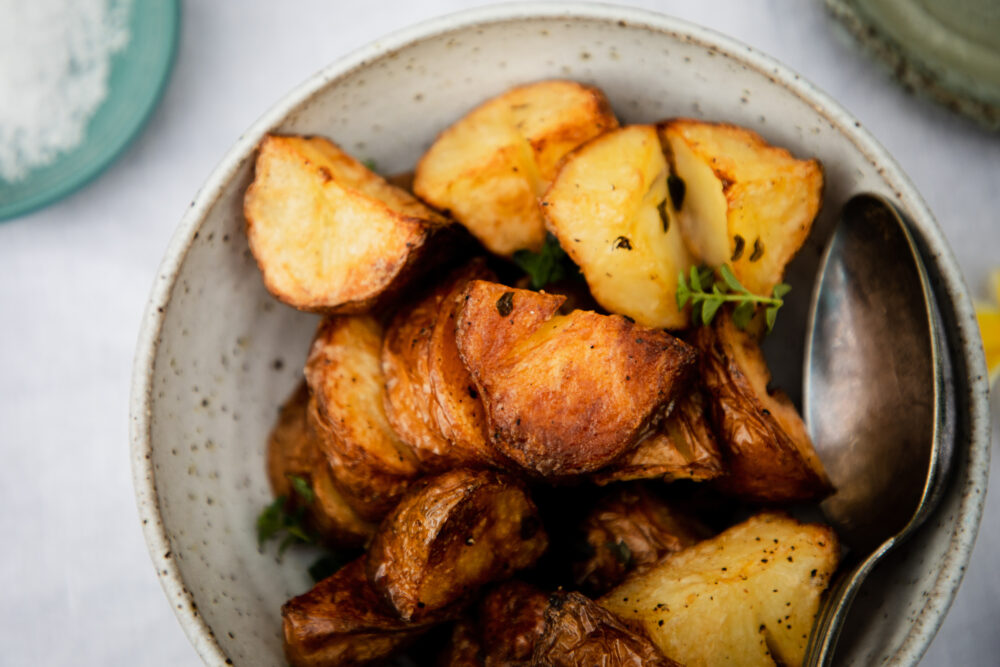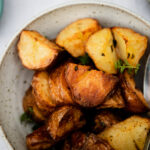Salt and Vinegar
Salt and vinegar roasted potatoes with duck fat, garlic and herbs is the perfect accompaniment to barbecued meat or fish.
My kids love these potatoes, and I often serve them when we have friends over.
Parboiling the potatoes in water and white vinegar gives them that lovely sharp vinegary taste, and you can do this step in advance to get a head start if you’re cooking for a crowd.
I’ve used thyme leaves but you can use different herbs – fresh oregano or rosemary also taste delicious.
Why parboil potatoes before roasting?
Parboiling before roasting gives you potatoes which are crispy on the outside, while soft and fluffy on the inside.
After draining the parboiled potatoes, it’s a good idea to shake them vigorously or rough them up a bit with a potato masher.
This increases the surface area of cracks and crevices for the duck fat, garlic and herbs, which, in turn, maximises the flavour and gives the potatoes that lovely golden colour.

Why use duck fat?
Duck fat has a higher smoke point than olive oil and butter. This means that you can cook with it at very high temperatures without it smoking.
Cooking potatoes with duck fat gives them a super crispy golden crust. The neutral flavour of duck fat also doesn’t overwhelm the potatoes, but it adds a delicious richness to them.
I love to use duck fat with these salt and vinegar roasted potatoes, but you can certainly substitute with olive oil if you prefer.
Roasting Potatoes
You can use many potato varieties for salt and vinegar roasted potatoes. If I’m cooking for a crowd, I usually buy large potatoes (which tend to be cheaper), such as the red-skinned Desiree or Red Pontiac.
If you prefer smaller potatoes, baby chats and Kipfler potatoes are good.
I rarely peel vegetables (unless a recipe specifically calls for it), so I leave the skins on the potatoes.
Furthermore, potato skins contain plenty of fibre, vitamins, minerals and phytochemicals, so why not leave them on!
More potato recipes
If you like roasting potatoes, you might like to try these parmesan potato wedges.
PS: If you’ve tried these salt and vinegar roast potatoes or any other recipe from At Amanda’s Table, please let me know how it turned out in the comments below.
And, if you’d like to read more, please subscribe to my newsletter for stories, recipes and tips for simple, nutritious meals.

Salt and Vinegar Roasted Potatoes
Ingredients
- 6 red-skin potatoes, skin on, washed (approx 1.5 kg) Desiree or Pontiacs
- 1 L water
- 500 ml white vinegar
- 6 cloves garlic
- 3 sprigs thyme, rosemary or oregano
- 2 tbsp duck fat substitute with olive oil
- sea salt
- black pepper
Instructions
- Preheat the oven to 220 ℃ and line a tray with baking paper.
- Cut the potatoes into large chunks. I like to slice them in half lengthwise, and then twice across, depending on the size of the potato.
- Put the potatoes into a large saucepan with the water and the vinegar so that the potatoes are completely covered. If you need to add more liquid, just keep the proportions of 2 parts water to 1 part vinegar. Add 1 1/2 tbsp salt.
- Bring to the boil, then turn down to a simmer and cook for 15 minutes until the potatoes are soft when pierced with a knife.
- Drain the potatoes and shake them vigorously or rough them up a bit with a potato masher. This will allow the potatoes to crisp up more when roasting.
- Add the duck fat to the baking tray and pop in the oven for 5 minutes so that the fat heats up.
- Meanwhile, add the chopped herbs and crushed garlic to the potatoes and shake them about.
- Remove the tray from the oven and add the potatoes, taking care not to splash any of the hot fat on yourself. Coat the potatoes with the duck fat, then return the tray to the oven. Turn the temperature down to 200 ℃.
- Give the potatoes a little shake halfway through cooking.
- Roast the potatoes for about 45 minutes until crispy and golden. Season with salt and pepper and serve immediately.


One word
DELICIOUS 😋